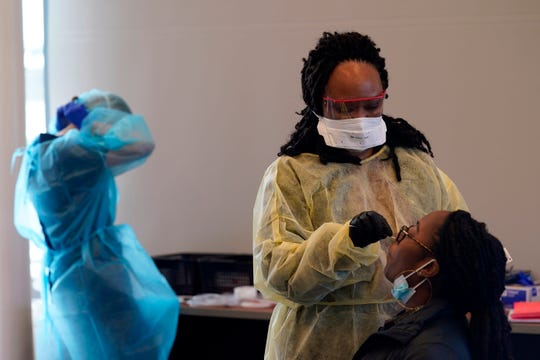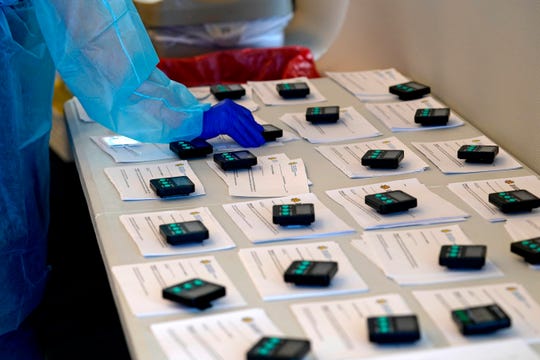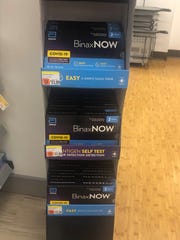As COVID testing nationwide wanes, researchers and marketers plot how to deploy cheap, rapid tests
In Chattanooga, Tennessee, public health workers are handing out thousands of rapid COVID tests at clinics, churches, restaurants and grocers.
It’s part of a big experiment to gauge whether flooding a community with rapid coronavirus tests can spur a meaningful reduction in cases and hospitalizations. Researchers want to know if people have free home tests, will they check their status and isolate if infected?
But the federally-funded testing initiative in Chattanooga and Greenville, North Carolina, comes as more than 60% of American adults have received at least one vaccine shot and cases have dropped to the lowest level since last June. Fewer Americans are getting tested and the share of tests with positive results has fallen below 3% for the first time since mass testing began, Johns Hopkins University data shows.
Barry Cline, of Portland, Tennessee, receives a COVID-19 vaccine from Chelsea Angel of Adhere Rx at a pop-up vaccination clinic on April 22, 2021. Vaccinations are lagging across Tennessee, but especially in rural areas like Portland. (Photo: George Walker IV, The Tennessean)
Consumers have more testing options than ever – including rapid tests that can be purchased without a prescription at major retailers such as CVS, Walgreens, Walmart and Amazon. The number of daily tests has fallen from a January peak of 2 million to fewer than 1 million as of last week, according to Johns Hopkins.
And the Centers for Disease Control and Prevention this month said vaccinated people without symptoms mostly don’t need to get tested even if exposed to the virus. People who are fully vaccinated and don’t have symptoms also should not be randomly screened, the CDC said.
Amesh Adalja, a senior scholar with Johns Hopkins Center for Health Security, expects fewer people will get tests even as more options hit the market.
“The major role of testing asymptomatic individuals I think is gone,” said Adalja, an infectious disease doctor.
Adalja said the vaccine was strategically deployed to reduce hospitalizations and deaths. Even as more Americans return to school, work and social events, U.S. coronavirus cases have dipped to about 25,000 each day, down sharply from earlier this year, when the country reported about 230,000 every day.
Jazmyn Finney, seated, is administered a coronavirus rapid test by a certified medical assistant at the student health center on campus at North Carolina Agricultural and Technical State University in Greensboro, N.C. on Feb. 3, 2021. (Photo: Gerry Broome, AP)
“Now we’re dealing with a more manageable respiratory virus,” Adalja said.
Still, experts say testing will remain a vital tool to track the virus. About one in five Americans said they will definitely not get vaccinated or only get a shot if required, according to a Kaiser Family Foundation poll released earlier this month. Some Americans with compromised immune systems or other health conditions who get vaccinated might not be fully protected. And even immunized people in rare instances can get sickened with breakthrough infections from emerging, contagious variants.
“Testing remains essential,” said Jennifer Nuzzo, lead epidemiologist for the Johns Hopkins Coronavirus Resource Center. “It is the foundation of our surveillance for this virus. It is how we understand is the situation is getting better or worse”
‘Take control of your own health’
Startups and established diagnostic companies that make rapid coronavirus tests are pushing ahead with several different products even as demand softens. Some allow people to collect their own saliva or nasal samples and mail testing kits to labs with results in a day or two. Others, such as Abbott’s BinaxNow and Quidel, sell paper-based tests that can be purchased by consumers at national chain pharmacies and mass-market retailers.
Large school districts also are screening students, teachers and staff as people return to the classroom. The Biden administration has pledged $10 billion to states to fund COVID testing in schools, but it will be left up to states and school districts to decide how to spend that money.
A certified medical assistant starts a timer for a coronavirus rapid test in the student health center at North Carolina Agricultural and Technical State University in Greensboro, N.C. on Feb. 3, 2021. (Photo: Gerry Broome, AP)
Quidel CEO Douglas Bryant expects demand will remain strong even though a growing majority of adults have been inoculated. His company markets the QuickVue coronavirus test, which delivers results in 10 minutes and also can be used without a prescription.
Bryant sees continued demand for his company’s and competitors’ tests because corporations will continue to screen employees returning to the office. Quidel tests workers twice each a week, even those who’ve been vaccinated, to prevent spread at the workplace.
”It’s useful that more and more people are being vaccinated,” Bryant said. “I certainly hope that’s useful in getting my employees back to work. But I am still finding positive people in my testing. I can’t really tell everybody that I can guarantee their safety 100%.”
He said the “worried well” and people who want to be proactive about their health will buy over-the-counter tests because “these are the same people who stock cold remedies” in their medicine cabinets.
He also thinks consumers will buy tests on their own as they venture out to social and entertainment events. People going to concerts or professional sports games are getting tested. Weddings delayed a year ago are once again on track with planners mailing COVID tests to guests flying from different regions of the country, Bryant said.
“Testing is the one thing you can do to take control of the situation, take control of your own health and protect those people around you,” Bryant said.
‘Do they stay home and not go to work?’
Public health officials in Chattanooga and Pitt County, North Carolina, say it’s too early to tell how the slowing pandemic will influence testing.
The Hamilton County Health Department wants to hand out thousands of Quidel rapid tests by the end of May throughout the Chattanooga metro region, both at clinics and mailed directly to homes. Public health workers have reached out to churches, clinics and targeted grocers, such as Latin-themed supermarkets, to reach Black and Latin communities hard hit by the virus.
Although new cases have waned from winter’s peak, the county has averaged nearly 30 daily cases this past week. Like other Southern communities, the county has vaccinated just over 1 in 3 eligible residents, a rate trailing the national average, said Dr. Fernando Urrego, the county’s interim health officer.
The contents of a COVID-19 home rapid testing kit is shown during a news conference, Thursday, May 20, 2021, at the Frederick Douglass Elementary School in the Overtown neighborhood of Miami. Miami-Dade County Public Schools and eMed, a local Miami telehealth company partnered to provide 1,000 free tests to students, teachers in the neighborhood. (Photo: Wilfredo Lee, AP)
“Having a testing kit out there to really help the community identify when they have an infection is really in my mind a game changer,” said Urrego.
People who get the test will have the option of answering questions as part of a study by researchers at the University of North Carolina at Chapel Hill and Duke University.
But what Urrego and other backers of the National Institutes of Health-funded initiative don’t know is whether community members will use free tests and isolate if infected.
The county plans to distribute 40,000 kits by the end of May and will give people another 30 days to test themselves three times each week. People who get the tests can join a study, answer questions and report results through an app or by calling public health officials.
“The whole purpose of this test is for people to screen and if they’re positive, to change behavior,” Urrego said. “Do they stay home and not go to work? That is what we’re ultimately hoping to answer.”
‘We’re not out of the woods’
Study leaders believe enough residents of both Pitt County, North Carolina, and Hamilton County, Tennessee, will participate to provide meaningful information. The communities were both targeted for the research trial because of they are vulnerable to COVID-19, said Dr. Giselle Corbie-Smith, a University of North Carolina professor of medicine.
But researchers also want to learn more about how community members respond when they get access to testing. Even though case counts are decreasing, new coronavirus variants or relaxed social distancing and mask wearing could make more people susceptible.
Ryan Furey stands with Monique Howard as she puts on her mask as she contemplates going into Rocket Fizz downtown on Thursday, April 29, 2021 in Chattanooga, Tenn. Hamilton County's mask mandate expired at midnight on April 28. (Photo: C.B. Schmelter, AP)
Researchers will compare cases, illnesses, hospitalizations and traces of the virus in sewage wastewater to evaluate how widespread testing affected the virus. The two communities will be compared to other similar-sized communities that did not get the home tests.
“We’re not out of the woods yet in terms of this pandemic,” Corbie-Smith said. “We want to know what could happen if this were something a community chose to do. What are the pragmatic considerations we need to think about?”
Among the considerations: When is it appropriate to administer rapid tests, which are generally less sensitive than lab-based PCR tests but also might detect when a person is more likely to infect others.
One factor public health officials must consider is the probability a person will test positive for a test. If a virus is widely circulating in a community, that raises the likelihood a person will test positive.
But if tests are widely used for screening people without symptoms in a community where there are few cases, experts warn doctors and consumers must be careful about interpreting results.
At-home COVID tests for sale at a drugstore. The CDC now allows at-home tests to be used to meet its requirement of a negative test before boarding international flights to the United States. (Photo: Dawn Gilbertson, USA TODAY)
The Food and Drug Administration authorized Quidel’s and Abbott’s over-the-counter tests as serial tests to reduce the likelihood people will get false results. The kits each come with two tests so consumers can test themselves twice, with a minimum 24-hour pause between tests, to reduce the likelihood of false results.
Corbie-Smith said the testing initiative in the two counties targets high-risk individuals within each household. “The reality is we also need to be thinking about what is the risk of infection,” she said.
Potential disruptions
Beyond the federal study in two counties, some experts said widespread testing of people without symptoms in schools or other settings could return false positives or detect late-stage infections when a person is unlikely to infect others. And such false alarms could bring unnecessary disruptions to students, teachers and school communities.
“People are going to shut down schools over these tests,” Adalja said. “It really makes little sense to do that at this point when we’ve now largely tamed the virus in this country by vaccinating our high-risk population to a high degree.”
That’s less of a concern for people who buy their own tests, Nuzzo said. Uninsured and low-income consumers might not have the means to purchase their own tests.
Those who can purchase the over-the-counter tests and choose to stay home are more likely to be isolated cases — not disrupting an entire class or company office. Quidel’s two-test kit is listed for $24.95 on Amazon.com and Abbott’s BinaxNow home test, which also includes two tests, sells for $23.99.
But Nuzzo agreed there is potential to disrupt schools and workplaces if decisionmakers are not careful about interpreting results from mass screening.
“I am worried about people being locked out of school or locked out of work due to a test result that’s not actually what we think it means,” she said.
Ken Alltucker is on Twitter at @kalltucker, or can be emailed at [email protected].
Source: Read Full Article







